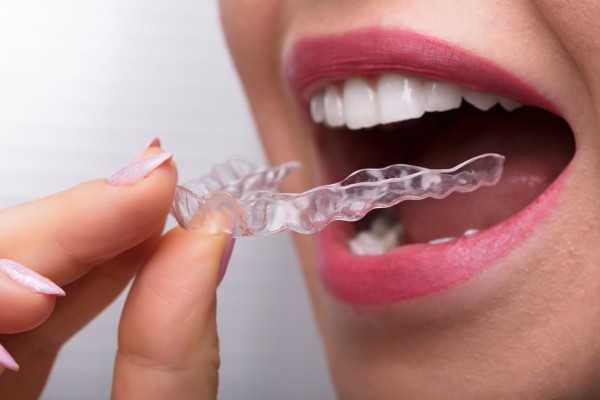Most people clench their teeth and grind them at some point during each day, and no real harm ever comes from it. The medical term for teeth grinding is bruxism, and if it does occur more than occasionally, it can cause other oral health issues. Many people who grind their teeth are completely unaware of it, because it happens during the hours of sleep. This activity can be triggered by anxiety or stresses experienced during the day, but it can also be caused by crooked teeth or an abnormal bite.
In less common cases, teeth grinding can also be attributable to some kind of sleeping disorder like sleep apnea. When you wake up in the morning and frequently sense soreness in the jaw or persistent headaches, it could be a sign of night-time teeth grinding. Even though you may not be aware of it yourself, a loved one or spouse might hear it while you’re sleeping, and point it out to you the next day. When you do detect these symptoms, or someone points out the condition to you, it would be advisable to contact your dentist and have it checked out.
Chronic teeth grinding
When bruxism becomes a chronic condition, i.e. something which persists more than a couple weeks, it can have a major impact on your overall oral health. It can cause your teeth to become loosened, fractured, and in a worst-case scenario, you might even lose one or more teeth. Chronic grinding has the potential to wear teeth down so badly that they become mere stumps, and that will necessitate some kind of oral intervention.
It may be necessary to install crowns, implants, bridges, root canals, partial dentures, or even a full set of dentures to overcome the effects of severe grinding. It’s also possible that your jaws can be affected, that TMD/TMJ can be either triggered or worsened, and that the entire appearance of of your face can be altered.
Prevention of teeth grinding
You should see your dentist as soon as you suspect that you may be grinding your teeth at night. Your dentist will probably create a mouth guard customized to your dental features, which will help to protect your teeth at night. If you are reasonably sure that your teeth grinding is due to stress or anxiety, you should consult your doctor or dentist about treatment options for stress. In such cases, your medical professional will generally prescribe counseling for stress, an exercise regimen, or muscle relaxant medications to help deal with the condition. If a sleep disorder is determined to be the culprit, treating that specific disorder should alleviate the grinding activity.
Apart from the medical treatment options, there are some things you can do yourself to help alleviate the severity and frequency of teeth grinding. Since caffeine may be a cause or contributor to teeth grinding, you should cut back on foods and beverages which contain significant amounts of caffeine. These include chocolate, coffee, and many types of sodas. Drinking alcohol can also either trigger grinding or worsen it, if you’ve already been grinding your teeth.
When you notice yourself absent-mindedly chewing on pencils or any other non-food objects, this is a habit which should be halted. It will help to relax your jaw muscles and avoid the tendency to do excessive chewing and grinding. You should avoid chewing gum for the same reason. Teeth grinding is a habit which you sometimes have to condition yourself to avoid. If you find yourself clenching and grinding your teeth throughout the day, one way to counteract this is to position the tip of your tongue close to, or in between the teeth. This has the effect of relaxing your jaw muscles, and discouraging the tendency to clench and grind.
Teeth grinding and children
Adults are not the only individuals who grind their teeth, since it is known that as many as 33% of all children also engage in the practice during their development. The two primary times when children grind their teeth are when their baby teeth are coming in, and when their permanent teeth are coming in. After both of these processes have taken place, teeth grinding in children tends to taper off.
However, teeth grinding can be continued in children if any of the other causes described above happens to occur to make it chronic. There are generally no problems associated with teeth grinding in children, when it’s associated with the emergence of new teeth. If the condition is perpetuated long after either of those events, however, it’s best to consult your child’s dentist, and try to determine the cause of the teeth grinding.
If you are having problems and would like an opinion from Good Samaritan Dental Implant Institute for bruxism or teeth grinding, we would be happy to provide a consultation.


